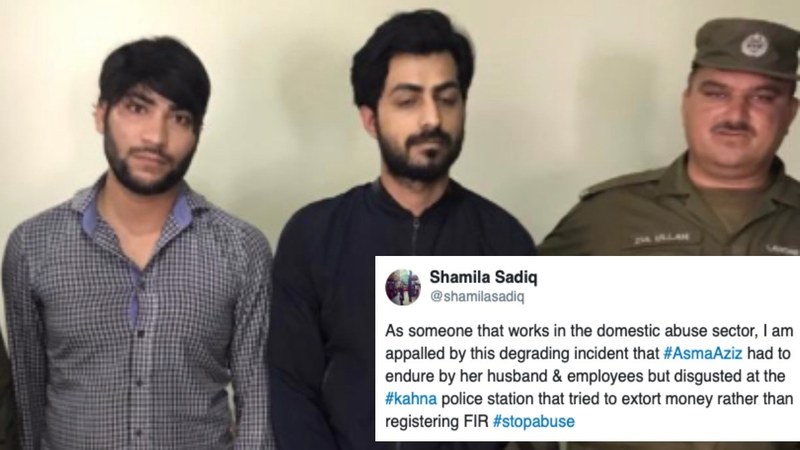Reactions to Asma Aziz's domestic violence case are proof that women are in crisis in Pakistan

Earlier this week police in Lahore arrested two men on allegations that they had tortured and abused a woman.
The woman is Asma Aziz, and the two suspects included her husband, Faisal. In a video circulating on social media, Asma said Faisal "took my clothes off in front of his employees [domestic staff]. The employees held me as he shaved my hair off and burned it. My clothes were bloody. I was bound by a pipe and hung from the fan. He threatened to hang me naked."
She said that when she went to the Kahna police station to register a complaint, "they asked me for money". She added that the police had, instead of providing her the FIR number or conducting a medical examination, asked her for money.
Read: How to respond when a sexual abuse survivor comes forward with their story
The case quickly captured attention on social media, with prominent personalities including Shireen Mazari condemning the incident and calling for justice to be served.
However, at the same time, other reactions proved that our culture of silencing women with victim-blaming and harassment is perhaps worse than ever. How do we get this to stop?
Here are some things one should never do when faced with a claim of domestic violence:
Do not coerce the victim to return to her abuser
A City 42 journalist who interviewed Asma asked her if she'd forgive her husband and fall in love with him again if he apologised in court. Talk about inconsiderate.
One of the many reasons perpetrators get away with violence against women is because survivors are forced by society to go back to toxic households and abusive relationships. Women are painted out to be hysterical and fussy, they're told "men will be men.
It's already very difficult for victims of domestic violence to escape from their abusers; they are psychologically tortured and gaslighted and abuse thrives on silence. If a survivor wants out of an unsafe environment, be supportive instead of telling them to return to that situation. Ask: “What can I do to help?”. If they were strong enough to make the decision to leave, encourage them.
Do not use the concept of 'love marriages' to shame and blame the victim
How is it at all relevant that Asma and her husband had married for love? Why do media houses feel the need to mention this while reporting the case?
Let's get one thing straight: marriage is a gamble.
You could have a love marriage and the person you thought you knew could change. You could have an arranged marriage and realise you found your soulmate. Saying that the reason why she was abused is because she had the gall to pick her own life partner is insensitive and victim-blaming behaviour, which may as well be our national sport if Twitter is any indication.
Do call for the police force to be sensitised to domestic violence and harassment
When Asma took her case to the police, she claims they asked her for money before registering a FIR and refused a medical examination on the same basis.
Domestic assault and harassment are very serious crimes and the police force need to be responsive to the needs of survivors while also helping them prepare a better case in case it goes to court. The traditional approach to interviewing with “who, what, when, where and how” doesn’t work well with victims who are experiencing trauma.
A lot of times, victims don't report these heinous acts precisely because when they do, they aren't taken seriously or in this case, asked for bribes. We need relevant trainings and more female officials dealing with such situations with compassion.
Additionally, journalists should also be ethical and examine their own personal biases while reporting on such issues.
Do donate to women's shelters and support networks
Abusive relationships are about control and a lot of times, that includes financial abuse. Until we move towards more pro-female legislation, coupled with legal aid, we have to make the most of the resources we have.
If you or someone you know is subjected to domestic violence, you can do something about it by referring them to women's shelters and support groups such as the CPLC's Women Complaint Cell or The Punjab Commission on the Status of Women.
Donate to NGOs and organisations like Dar-ul-Aman, Aurat Foundation, Sahil and Women's Action Forum to name a few.
All incidents of domestic violence can be reported to the Punjab Commission, from anywhere in the province. The Commission then transfers your case to the police.
If you need guidelines on how to file a First Information Report (FIR) or are having difficulty getting a case registered, you can contact them for further help.
You can also consult their Helpline Guide before calling or directly call them on 1043 (toll-free).